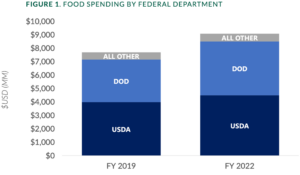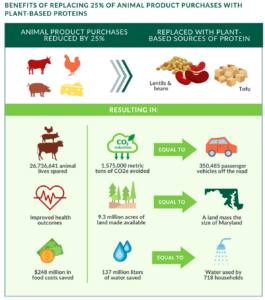Introducing the EFFECTIVE Food Procurement Act
Update: December 5, 2023: The EFFECTIVE Food Procurement Act has been assigned bill numbers: S.3390 in the Senate and H.R.6569 in the House of Representatives.
—
In anticipation of the 2024 Farm Bill, we are proud to play a part in introducing new federal legislation that would leverage billions of dollars of food spending by USDA to help build a more just, healthy, and sustainable food system.
Introduced by Senator Edward J. Markey (D-Mass) and Congresswoman Alma Adams (NC-12), the Enabling Farmer, Food worker, Environmental, and Climate Targets through Innovative, Values-aligned, and Equitable (EFFECTIVE) Food Procurement Act would direct and support USDA to shift toward values-aligned food procurement. The legislation would benefit workers, farmed animals, and the environment alike, and has been endorsed by more than 200 organizations.
The vast majority of USDA’s food purchases are not congruent with its own values-based goals and policy objectives like mitigating climate change, conserving natural resources, building resilient supply chains, supporting socially disadvantaged producers and worker well-being, and expanding healthy choices for schools and its other program beneficiaries.
The EFFECTIVE Food Procurement Act would change that. The Act was inspired by a new Federal Good Food Purchasing Coalition (FGFP Coalition), of which Farm Forward is a founding member. The FGFP Coalition grew out of the Good Food Purchasing Program (GFPP), a flexible metric-based framework that encourages large institutions to direct their buying power toward six core values including equity, nutrition, valued workforce, animal welfare, environmental sustainability, and community-based economies. For years, we have led the team that updates GFPP’s animal welfare value area. As GFPP has been implemented by dozens of cities, municipalities, and school districts across the country, we have seen the outsized role that the federal government plays in food purchasing. This year we joined with other GFPP leaders in a concerted effort to redirect those federal food dollars, almost 40 percent of which in 2022 was spent on animal products. In 2022, The biggest food purchaser in the federal government, USDA, spent more than four billion dollars on commodity foods for school districts, food banks, low-income seniors, foreign aid, and Indian reservations.
The USDA primarily purchases from a handful of agricultural megacorporations, many of which have repeatedly violated labor, environmental, and animal welfare laws. For example, Tyson Foods accounted for 43 percent of USDA poultry spending in 2022, despite incurring more than 30 workplace and environmental violations within three years of receiving their contract, and USDA suspending program personnel at Tyson due to what USDA termed “egregious violation of the humane handling requirements” that very year.
The EFFECTIVE Food Procurement Act would shift USDA away from evaluating bids based only on cost to evaluating bids based on multiple values, including equity, worker well-being, climate mitigation, animal welfare, resilient supply chains, and nutrition. While increasing transparency in USDA spending, the Act would (among other things) measure and reduce greenhouse gas emissions associated with USDA’s procurement, provide grants and technical assistance to small and socially disadvantaged producers and businesses, and shift USDA’s purchases of animal products from the lowest common denominator to more pasture-raised livestock, more farms participating in independent animal welfare certification programs, and more plant-based proteins.

The social and environmental benefit of such shifts would be staggering. Earlier this year the FGFP Coalition produced a report on federal food purchasing with findings including:
- The USDA is the largest direct food purchaser in the federal government, and combined with the Department of Defense accounts for 90 percent of direct federal food purchases, which totaled more than $9 billion in 2022.
- The USDA Foods Program had a carbon footprint of more than 19 million tons of carbon dioxide equivalent between the school year of 2018 and 2019, equal to the annual emissions from 4.1 million cars.
- Replacing 25 percent of federal animal product purchases with plant-based sources of protein would spare 26,736,641 animal lives, make available 9.3 million acres of land (equal to the size of Maryland), save $248 million, and reduce 1.6 million tons of Co2e annually—more than the equivalent of taking every passenger vehicle in Washington, D.C. and Alaska out of commission, all year, every year.
 On November 7, Farm Forward and other representatives of the FGFP Coalition met with Senator Richard Blumenthal’s (D-CT) office, and we’re pleased that Senator Blumenthal has now signed on as the bill’s Senate cosponsor.
On November 7, Farm Forward and other representatives of the FGFP Coalition met with Senator Richard Blumenthal’s (D-CT) office, and we’re pleased that Senator Blumenthal has now signed on as the bill’s Senate cosponsor.
You may be interested to review the FGFP Coalition’s report on how we could better leverage federal food purchasing for climate, environmental, and social benefits, and the Civil Eats article about the Act. But most importantly: all U.S. residents can contact their senators and representatives to ask that they support the EFFECTIVE Food Procurement Act. Just look up their phone numbers on the Senate and House directory, and call them to ask your Senators to support S. 3390, Senator Edward Markey’s EFFECTIVE Food Procurement Act, and your Representative to support H.R. 6569, Congresswoman Alma Adams’s EFFECTIVE Food Procurement Act.
Good food purchasing at the federal level is the next step in how we are building a better future for American workers, communities, ecosystems, and farmed animals. Together, we are building a future free of factory farms.
Last Updated
December 5, 2023